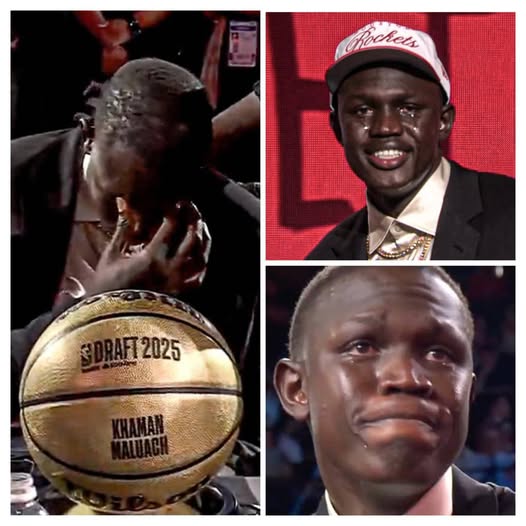Khaman Maluach didn’t grow up with hardwood floors, bright arena lights, or sneaker sponsorships. He didn’t have coaches with whiteboards or cameras broadcasting his highlights to millions. What he had was a ball, a dream, and bare feet. In the dusty streets of Uganda, where basketball hoops were often just metal rings nailed to wooden poles and the court was any stretch of open dirt, Maluach’s journey began. Today, the 7-foot-2 South Sudanese native is an NBA Lottery Pick—his name called by the commissioner, his future immortalized in the league’s history, and his story already etched into the hearts of millions across Africa and beyond.
When ESPN confirmed his selection, it wasn’t just a draft pick—it was a movement. It was the culmination of sacrifice, pain, and perseverance that started in the shadows of war and refugee camps. For many fans who’ve followed Maluach’s rise from obscurity, the tears were real. Not of sadness, but of pride and inspiration.
Khaman was born into adversity. His family fled conflict in South Sudan, seeking refuge in Uganda—a country that provided safety but little certainty. Life in refugee camps was never easy. Food was scarce, opportunities even scarcer. But Khaman, tall beyond his years even as a child, began to draw attention simply by walking down the street. Basketball, however, wasn’t handed to him—it had to be discovered.
He was introduced to the game through a local outreach program organized by Basketball Without Borders, and it was there that the embers of a dream were lit. At first, he struggled. No formal training. No resources. No shoes. Yet, he practiced, ran drills barefoot, and watched YouTube clips of NBA stars on shared community phones whenever possible. He fell in love with the sport, and in time, the sport fell in love with him.
His potential quickly became undeniable. Talent scouts began whispering about the lanky teenager with raw skills and freakish athleticism. That whisper turned into buzz, and buzz into headlines. He was offered a place at the NBA Academy Africa, a life-changing opportunity based in Senegal that provided education, nutrition, training, and exposure. For the first time, Khaman had real sneakers, proper facilities, and mentors who saw in him something special.
Still, the road was steep. The transition from refugee life to elite competition wasn’t seamless. He had to learn English, adjust to structure, battle self-doubt, and carry the hopes of a continent. But every setback only sharpened his focus. He studied not just how to dunk or block shots, but how to lead, how to think the game, how to carry himself with humility in the face of growing fame.
In the years that followed, Maluach participated in prestigious international camps, dominated at youth tournaments, and eventually played for South Sudan’s national team—becoming one of the youngest ever to do so. He wasn’t just representing a flag; he was representing a generation of displaced children who dared to dream beyond survival.
And now, as he walks across that NBA stage in a tailored suit—far from the barefoot days of his childhood—he’s not alone. With him are the invisible hands of his mother, who shielded him from violence; of the mentors who taught him how to believe; of the camp kids who once passed around a deflated ball and cheered for every shot he took.
His selection wasn’t just historic—it was symbolic. Khaman Maluach became one of the few players born and raised in Africa to be drafted directly from the NBA Academy system, a powerful validation of the league’s investment in global talent development. More importantly, he became a beacon of hope. Proof that greatness can rise from rubble, that talent can be discovered in the unlikeliest places, and that the NBA dream isn’t reserved for those with privilege.
Social media exploded with tributes. African players like Joel Embiid, Pascal Siakam, and Giannis Antetokounmpo—who themselves share immigrant or refugee roots—saluted his triumph. Fans flooded timelines with messages like “He’s the hope of Africa,” and “From no shoes to NBA suits—this is what dreams are made of.”
Khaman, holding back tears in his post-draft interview, didn’t speak like a teenager. He spoke like a man who’s lived several lifetimes. “I want every kid in a refugee camp right now to know that they’re not forgotten,” he said. “This is not just for me. This is for them.”
His voice cracked, but his resolve did not.
It’s easy to see the glitz of draft night and forget the grit behind it. But Maluach’s story is a reminder that basketball is more than a sport—it’s a lifeline. In places where despair is often the default, a ball can be the spark that lights a path out. His journey also reflects the power of global initiatives like the NBA Academy, which continue to mine talent and ignite dreams in regions too often overlooked.
Now, as he joins his new NBA franchise, the expectations will be high. Scouts see him as a rim protector with untapped offensive potential—someone who could develop into a defensive anchor and a franchise cornerstone. But for those who truly know his journey, his value goes far beyond stats or accolades. He is a storyteller. A testimony.
There will be more battles ahead—adjusting to NBA pace, dealing with fame, learning a new culture, and proving himself night after night. But if history is any indication, Khaman Maluach won’t be fazed. He’s already survived more than most can imagine. Every rebound he snags, every block he makes, every dunk he throws down will be powered by something much deeper than muscle. It will be powered by memory—of where he came from, of who he’s fighting for.
And for every young boy in Uganda playing with a plastic bottle instead of a basketball, or every girl in a South Sudanese camp drawing a hoop in the dirt, he’ll be a lighthouse.
As ESPN’s cameras panned to his family in the crowd, tears flowed freely. A mother once too poor to feed her children now watched her son shake hands with billionaires. Coaches cried. Fans wept. Not because the story ended, but because a new chapter had begun—one they never thought they’d live to see.
Khaman Maluach didn’t just make the NBA. He made history. And in doing so, he made millions believe again.



